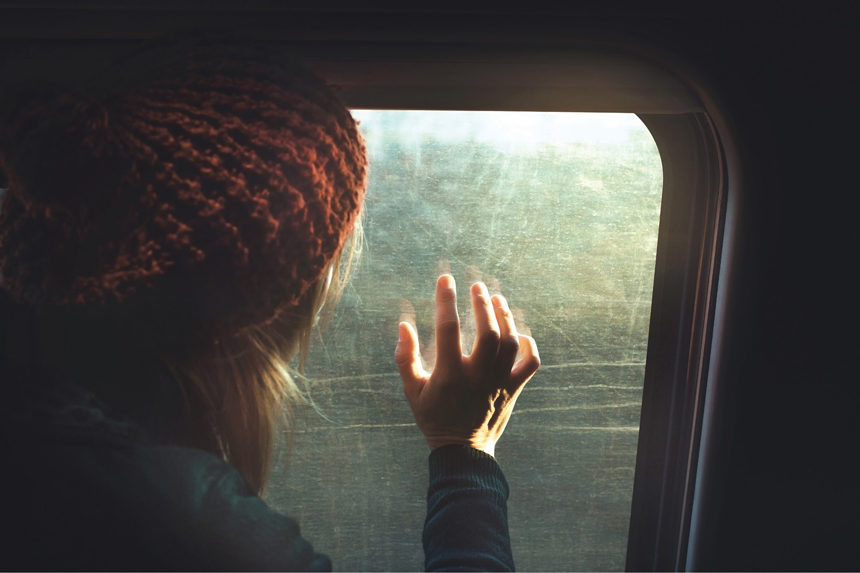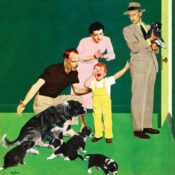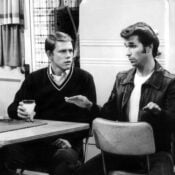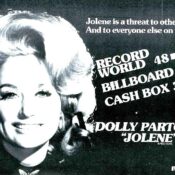In September of 2019 — those innocent days before the coronavirus would have made a trip like this foolhardy — I took the train across Canada from Toronto to Vancouver. I did it because being trapped in a railroad car for multiple days seemed like the perfect way to think about death, and that was something I sorely needed to do. The plan was that as the train made its way ever west, my thoughts would travel inward attempting to give my brain and my heart a much-needed self-examination. Ultimately, I wanted to try and exorcise the ghost who had become my constant companion.
Eight years earlier, our 17-year-old son Jack took his own life. No one saw it coming. He was mad and then he did the unthinkable. I heard the shot and found him sprawled across his bed, his life dripping out of him and pooling on the floor. I can almost dispassionately write those words today because I’ve spent years telling myself they are just words words words. I have given myself the power to disassociate these words from images I have forced my brain to file in the folder titled “Do Not Open This.”
That night, as my husband Tim wailed, “Our lives will never be the same!” I was plunged into a state of near catatonia and spent a year wrapped in an old red quilt sitting in an overstuffed green chair. I watched hundreds of hours of British police procedurals, perhaps attempting to solve the mystery that was Jack. Now, years later, after drinking too much, eating too much, avoiding people, countless hours of therapy, and a healthy daily dose of antidepressants and anti-anxiety medication, I can move through the world once again.
Jack accompanies me wherever I go. Sometimes I see him, shadow-like, out of the corner of my eye, passing the end of an aisle in the grocery store. Or he’s ahead of me on the sidewalk, tall and lanky, walking with his hands stuffed in his pockets. Or he’s looking at me from the window of a passing bus. I’m at the point where I would like him to stay within the confines of the picture frames in my house or the photo file labeled Jack on my computer. I need to free myself of my boy albatross who keeps me in a sad state of expectation.
My plan was to think as hard as possible about Jack for the five days it took to cross Canada and then to gently say goodbye. I would carefully curate my experience, writing about Jack in my journal, painting watercolors inspired by my thoughts of him, and imagining him wandering through the passing and ever–changing landscape.
In my little sleeping compartment, I sat in a comfortable chair during the day, and at night I would sleep in a bed that pulled down from the wall. I set my little watercolor kit and journal on my armrest while I sat and stared out the window. The train moved slowly through Ontario with its boggy and glacially sculpted landscape and its low-slung blueberry bushes painted red with autumn, periodically punctuated with stands of dark evergreens. I wrote in my journal about how much Jack would have loved this landscape — its wildness and vivid colors would have appealed to the boy with the artist’s sensibility who was anxious to see the world. I did not dream of Jack that night as the ker-chunk ker-chunk of the railcar lulled me to sleep.
I woke before dawn to make my way to the observation car to watch the sun creep up on the horizon and then bathe the broad landscape in low-angle light. I expected to see woolly mammoths wandering through this part of Canada — the Canadian Shield — whose rocks are almost four billion years old. I was genuinely happy as I witnessed what felt like the primordial beginnings of our planet unfolding around me.
That afternoon I gathered my watercolor kit and went to the salon car for the crafting hour. The 13 women there were all knitters. I sat across a table from one who told me her horrible cancer story while knitting an intricate Celtic pattern without looking. I felt a bit flushed as I sat, and quickly sketched and painted in my journal while listening to details that I believed were making me feel lightheaded. The woman sitting behind me came to sit at our table so she too could tell her cancer story. As the two traded tales of chemo and radiation and engaged in the kind of one-upmanship that happens when people talk about illness, I looked out the window. Blueberry bushes gave way to black-and-white cows grazing in pasturelands divided by streams and little bluffs. I watched as red combine harvesters drove back and forth across vast fields of wheat and spat grain into huge trucks that drove alongside.
By the time I left the knitters, I knew I was sick. I spent the next three days sitting or lying on my bed in my private compartment the size of my dining room table. I ate Advil like candy and took a roll of toilet paper from a bathroom to use for tissues. I felt delirious as I lay there and looked out my window, trying to periodically take photos so later I could see what I missed. I didn’t leave my cabin, although I was desperate for gallons of hot tea, which I imagined would make me feel better.
Oh, Jack! Why did you leave me? I compounded my alternating fever and chills by drinking from my endless well of sadness. We traveled through Saskatchewan — I missed it. In my delirium, I saw some huge, iconic wooden grain elevators in Alberta, and that became my memory of that province. We stopped at a little Canadian prairie town, and I watched as an Amish family got off the train — a man in a straw hat and work clothes, and a woman in a dark blue dress that fell below her knees, her hair pulled tight and held in place by a white cap. She carried a sleepy baby. I wondered what their farm looked like and if they used horses or mules, or maybe this was one of those places where the Amish community agreed they could use gasoline equipment as long as it was pulled by four-legged animals.
A train attendant poked her head into my cabin and said she hadn’t seen me at meals. She held a large cup of hot water and packets of honey, which she put on the armrest that doubled as my bedside table. She said she would check on me throughout the day to see if there was anything I wanted. I cried because it was such a nice gesture. I was completely wrung out and could only think about how trapped I was on that train. Where once the sound of the kerchunk kerchunk of the wheels on the track sounded soothing, it now taunted me with its never-ceasing, metal-on-metal melody.
We entered the Canadian Rockies on our last day. I yearned to be in the observation car but knew I was the Typhoid Mary of the train. I watched as we passed immense jagged granite peaks that rose abruptly from the plains. We hugged the bank of a river for miles as we wound through those sharp-edged mountains. I knew I was still not right because every photo I took was skewed as if seen through the eyes of someone tripping on acid in a late-’60s movie. We stopped at Jasper for an hour. Everyone piled off the train and headed into town. I imagined myself searching for good coffee, a newspaper, and souvenirs. Instead, I took a picture of the train platform from my bed. I was well enough to search for Jack among the strangers on the platform, but he was not there. I squinted thinking he might appear as an apparition through partially closed eyes. I did not see him.
We arrived in Vancouver, disembarked, and walked into the beautiful, cavernous, Beaux-Art train station that was oddly empty. I went to the coffee stand, but the attendant had left his post, so I sat on a wooden bench. I looked through my blurry cockeyed photos trying to reconstruct a trip that I was never really there for. And I thought about my illness — the flu, I guess, although I had gotten a flu shot — and how it came upon me so quickly. And it struck me that it was akin to a purge. I had gotten on the train with the intention of purging my guilt and my grief, and consequently, I thought, Jack, from my life. Then, when I became sick, I was so self-absorbed as I lay in my compartment and watched Canada pass by that I couldn’t focus on my intentional mission.
Sitting in that train station, I felt oddly better — emotionally lighter — and I knew it was because Jack was going to let me go. I realized I had paid my eight years of penance and had finally atoned for what was my part in Jack’s decision to leave this world. So in that building — a marble-clad, century-old symbol of hope that the railroads would bring all good things to western Canada — I let my boy go, to soar above the waterways and islands and the great coniferous forests of the Pacific Northwest.
Rachel Dickinson is the author of several books; her most recent is The Loneliest Places: Loss, Grief, and the Long Journey Home (Cornell University Press, October 2022). Her work has appeared in numerous publications, including The Atlantic, Outside, Men’s Journal, Aeon, Salon, and Audubon.
This article is featured in the July/August 2022 issue of The Saturday Evening Post. Subscribe to the magazine for more art, inspiring stories, fiction, humor, and features from our archives.
Featured Image: Shutterstock
Become a Saturday Evening Post member and enjoy unlimited access. Subscribe now




Comments
I’m reading this, as I sit here on a train, bound for Toronto. I’m getting a portrait tattoo of my SON, whom passed by suicide, ten month’s ago. Thinking that I too, could stay on this train and end up, wherever….BRANDON’S MOM
I read this piece for a writing class that I took. Very well done. I just ordered your book. It’s the kind of loss that is hard to find peace about.
Yes, I was thinking, in Saskatchewan, it was probably the Hutterites, but the white caps make me think Amish, too.
And the part about the cancer patients. You hear about cancer, and it’s just a different kind of loss, like it doesn’t compare to yours.
One reader suggested that the family I identified as Amish were likely Hutterites. I believe he is correct!
Thanks for that comment, Bob. I think I will always be searching for peace, but I do feel a bit more settled.
There’s a lot to think about here, and take in. This is one woman’s personal odyssey she alone had to take for resolution and relief regarding her son’s death, 8 year later. Hopefully what had been open wounds will heal, becoming manageable scars instead, so she can move forward in peace.